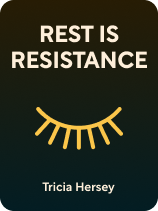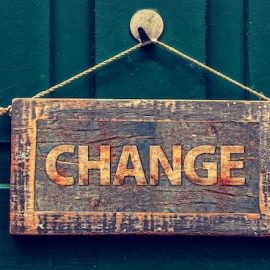

This article is an excerpt from the Shortform book guide to "Rest Is Resistance" by Tricia Hersey. Shortform has the world's best summaries and analyses of books you should be reading.
Like this article? Sign up for a free trial here.
Is rest truly a form of resistance? Can taking a break actually lead to social change?
Rest Is Resistance, a book by Tricia Hersey (the “Nap Bishop”), challenges our society’s obsession with productivity. The book offers both inspiration and practical advice for reclaiming our lives from exhaustion and burnout.
Keep reading for an overview of the book and to discover how rest can be a radical act of self-care and societal transformation.
Rest Is Resistance Book Overview
Rest Is Resistance, a book by Tricia Hersey, reframes the act of resting as a powerful tool for healing and social justice. Half call to action and half how-to guide, this book promotes rest as a way to reclaim your life from “grind culture”—an exploitative and dehumanizing culture that values productivity over people’s well-being.
Hersey, who calls herself the “Nap Bishop,” is the founder of The Nap Ministry, an organization that advocates rest as a form of resistance and healing, particularly for Black people and other marginalized communities. Her concept of “rest as resistance” stems from her experiences with exhaustion and burnout, as well as her research into the historical context of sleep deprivation among enslaved and oppressed peoples, particularly Black Americans. Hersey holds a degree in public health as well as a Master of Divinity degree from Candler School of Theology at Emory University.
We’ll begin this overview by explaining why modern grind cultureis harmful both physically and psychologically, and how it indoctrinates people to work themselves to death. We’ll then discuss the crux of Hersey’s manifesto: Rest isn’t just good for you, it’s also an act of direct resistance against this toxic culture. (“Rest” in this case doesn’t just mean sleep; rather, rest is a deliberate choice to do something that is not productive, something that serves no purpose except to heal you and restore your strength.)
Finally, we’ll review some of Hersey’s suggestions about how to rest in a healthy and restorative way, enabling you to start undoing the harm that grind culture has inflicted on you.
Grind Culture Is Deadly and Insidious
Hersey begins by saying that grind culture is taking a severe toll on people both physically and spiritually. She argues that modern society’s relentless focus on productivity—in addition to leaving people perpetually exhausted and unwell—has robbed us of essential human experiences like pausing, dreaming, and using our imaginations.
The author adds that grind culture is fundamentally toxic because it treats people like machines: It exploits the population for the economic gains of a few wealthy elites, then tosses people aside when they’re no longer useful. In the process, “the grind” destroys people physically, mentally, and spiritually.
We’ll discuss the origins of grind culture and how modern society indoctrinates us to believe that we must live only to work.
The Roots of Grind Culture
Hersey views grind culture as the intersection of capitalism and white supremacy. She says we must recognize, understand, and resist these two systems in order to reclaim our lives from grind culture.
How Capitalism Contributes to Grind Culture
Hersey says capitalism has profoundly shaped modern society’s values and expectations, and led directly to the emergence of grind culture.
At its core, capitalism is driven by the pursuit of profit and economic growth. While that doesn’t seem harmful in theory, in practice it creates constant pressure to achieve, produce, and excel at any cost. This relentless drive for efficiency and productivity has created a society that rejects the idea that people have inherent worth; instead, modern society measures people’s value by their wealth and professional success.
Hersey says that this mindset has particularly taken root in academia. Students are often expected to maintain high standards of academic achievement while juggling multiple other responsibilities like extracurriculars and jobs. Their parents and teachers constantly reinforce the message that this is all necessary because the students need to make themselves look good to prospective universities or employers—after all, it’s only a matter of time before they’ll be competing for limited openings, whether in higher education or in the workforce.
This atmosphere of constant pressure and competition normalizes exhaustion and disconnection, and teaches students that their well-being is a necessary sacrifice on the path to success. The academic grind, therefore, serves as indoctrination into grind culture and a training ground for the post-school world.
How White Supremacy Contributes to Grind Culture
Hersey explains that the foundation of white supremacy is the refusal to see certain people as people. Instead, the white supremacist mindset views nonwhites as some sort of inferior species more akin to animals; creatures who not only can be exploited, but should be exploited.
As such, white supremacy is an ideology that values results over (some) people’s well-being. For instance, if an enslaver works a slave to death, the enslaver would most likely react as if they’d broken a tool, rather than acknowledging that their actions had killed another human being. Hersey says that these white supremacist principles of valuing results and devaluing people are also central to grind culture.
Furthermore, although grind culture is not overtly racist—indeed, many white people are also victims of it—Hersey says that the grind impacts Black people more severely. There are two main reasons for this: first, because society values Black lives less than white lives, and therefore Black people are more likely to have their needs ignored and their problems dismissed. Second, because Black communities tend to have lower incomes than their white counterparts, so people have to work longer hours in order to support themselves.
As an example of this racial imbalance, Hersey discusses the sleep gap: Research shows that Black people in the US tend not to get as much sleep as white people do, largely because they need to work longer hours to sustain themselves. This lack of good-quality sleep severely impacts Black Americans’ health; Hersey’s own father worked himself to death at the age of 55.
How Grind Culture Indoctrinates People
Hersey says that modern society indoctrinates people into believing that work is their primary reason for existing. This pervasive “live to work” mentality, deeply ingrained by grind culture, has warped our relationship with rest and leisure. As a result, many individuals find themselves unable to truly rest—either because they’ve forgotten how, they believe they don’t deserve it, or they don’t think they can afford to stop working even briefly.
Three myths form the foundation of this toxic belief system.
Myth #1: People’s Value Comes From Their Work
Grind culture teaches that people’s value comes solely from what they do, and is measured by their productivity, achievements, and wealth. Therefore, in order to prove their worth, people must orient their entire lives around labor.
However, Hersey says that this belief is fundamentally flawed and harmful. Obsessing about productivity drives people to exhaustion, as well as creating pervasive feelings of guilt and shame because people believe they’re not doing enough. She therefore rebuts this idea, saying that our worth as human beings is inherent, and not contingent on productivity or career success.
Myth #2: Rest Is a Luxury
The second myth grind culture pushes on us is that rest is a luxury, and therefore it’s reserved only for those who can afford to take a break from working. This mindset often leads people to view rest as a privilege they must earn through hard work or financial success.
Hersey says that, in reality, rest is a fundamental human need and should be a priority for everyone, regardless of their social or economic status. Rest is not a luxury or an indulgence; it is an essential component of a healthy, balanced life.
With that said, it’s true that people need money to survive under capitalism—many people literally can’t afford to stop working and get the rest they need. This is why Hersey argues that rest must be a communal priority as well as an individual one, so that people can support each other in their efforts to heal from grind culture.
Myth #3: We Must Compete for Scarce Resources
The third myth of grind culture is that there aren’t enough resources (money, food, property, and so on) for everyone. Therefore, according to grind culture, we must all ruthlessly compete for these scarce resources, and hoard as much as we’re able to get.
Hersey argues that this individualistic worldview overlooks the ways people are connected. Humans are inherently social creatures; we evolved to live and thrive in groups. Therefore, people’s physical and emotional well-being depend on connection and cooperation.
Hersey also says the truth is that the world is abundant, meaning there are more than enough resources to meet everyone’s needs as long as we share them fairly. The only reason people suffer from issues like hunger and homelessness is because grind culture indoctrinates us to be selfish, instead of sharing the world’s wealth equitably.
Hersey adds that many forms of scarcity are artificially created or exacerbated by systemic issues, rather than by true physical limitations. For example, housing and diamonds are both artificially scarce (and therefore artificially expensive) because large corporations control much of the world’s supply.
Rest Fights Back Against Toxic Systems
Hersey frames resting as a radical act of resistance against grind culture. This is because rest isn’t just self-care, it’s also a challenge to the dehumanizing beliefs and practices of a society that values productivity above all else.
We’ll discuss how resting helps you to heal from the damage that grind culture inflicts on your body and your spirit. We’ll also explore how rest makes it possible to imagine and fight for a better future.
Resting Enables Healing
Hersey says that, through rest, people can begin to heal from the harm inflicted by grind culture. While resting, your body and mind engage in crucial processes that support your overall well-being. Rest is vital for physical health because it promotes healing, supports the immune system, and restores the body’s strength.
Resting Is a Spiritual Practice
Hersey adds that rest isn’t just an act of physical rejuvenation, but also one of spiritual self-care.
She explains that grind culture wants to break your spirit—your innate sense of self-worth and purpose—in order to turn you into an obedient worker. If it succeeds, you’ll devote yourself to grind culture based on the false promises that you can fulfill those spiritual needs with money (value) and a job (purpose).
However, because grind culture is a direct attack on your spirit (or, as some would say, your soul), your spirit will naturally resist it. Resting when you need to is, therefore, a way to take care of yourself spiritually. In other words, rest is a refusal to allow grind culture to crush your spirit and an affirmation of your inherent right to simply exist without “proving” your value.
She adds that rest also provides you with opportunities for reflection, connection, and renewal. These are chances to heal your soul from the damage that grind culture has inflicted, and to strengthen your spirit so you can withstand future hardships.
Resting Allows You to Dream
In addition to the personal benefits of rest, Hersey also highlights its strategic importance in the ongoing fight for social progress. She explains that resting helps you to reclaim your ability to dream—both in the literal sense of having dreams while you’re asleep and in the sense of having daydreams or hopeful imaginings.
By allowing yourself to rest, you create opportunities for your mind to wander, imagine new possibilities, and envision alternative futures. This imaginative process is crucial for challenging the toxic status quo. This is because, before people can fight for change, they have to be able to picture the society they’re fighting to create.
How to Rest
Hersey says that even attempting to rest has become a battle, largely because our culture lacks authentic models for how to rest. Rest is a slow, deliberate process that must address your physical, emotional, and spiritual needs.
In contrast, many popular and trendy “resting” practices are still rooted in harmful capitalist ideology. These practices offer quick fixes with the aim of rejuvenating workers just enough to get them back to work. For instance, it’s fairly common for large companies to offer employee “retreats,” where their workers can spend a day or a weekend enjoying themselves at the employer’s expense. However, not only does this misconstrue rest as something short-term that’s only done on special occasions, it’s also not done out of genuine concern for the employees’ well-being. Instead, such retreats are just another tactic to boost productivity.
We’ll review some of Hersey’s suggestions for how to practice genuine, restorative rest. We’ll then conclude with Hersey’s vision of a community that values well-being over productivity—a place where people come together in a collective mission to reject grind culture, ensuring that everyone gets the rest they need and deserve.
Rest Practices
If there are no cultural models for rest, then how can you learn to rest effectively? Hersey gives a number of suggestions for disconnecting from grind culture and creating space for yourself to begin healing.
Believe that you deserve to rest: Hersey says that true, restorative rest begins with a shift in mindset. You must believe that you truly and inherently deserve rest, with no need to “earn” it. This is because, if you spend your rest time feeling guilty or worrying about all the things you’re not doing, you will not rest effectively.
Snatch rest whenever you can: In our busy lives, it’s crucial to seize moments of rest whenever they present themselves. Whether it’s a few minutes between tasks or an unexpected lull in your schedule, take advantage of these opportunities to recharge and rejuvenate however you can, whether that means taking a quick nap or just taking a moment to sit and breathe.
Indulge in daydreams: Hersey promotes daydreaming as a form of rest that can be accessed at any time, calling it a “mini-nap.” Even when you’re physically stuck at work, you can restore a bit of your strength by imagining yourself in a more pleasant situation, or motivate yourself by envisioning a more equitable and loving society.
Create a nice environment: Design a restful space that appeals to your senses and promotes relaxation. Incorporate soft surfaces, ensure you feel safe and secure, minimize noise, engage in gentle stretching, and consider using calming scents like essential oils to create a soothing atmosphere.
Detox from social media: Take regular breaks from the constant stream of information and stimulation provided by social media platforms. This digital detox can help reduce stress, improve focus, and allow you to be more present in your surroundings and relationships.
Practice spirituality: Spirituality (whether religious or secular) provides a framework for understanding our place in the world, which can offer comfort, a sense of purpose, and resilience in the face of life’s challenges. Therefore, Hersey recommends doing things that bolster your sense of belonging, self-worth, and control over your life. For example, practicing spirituality could mean attending religious services or meditating at home.
Hersey concludes by saying that different people may need to find rest in different ways, and that only you can determine what works best for you. Therefore, resting should be a daily practice, as well as a lifelong process of learning what makes you feel better—what you can do to best meet your own unique needs.
Tip: Real Rest Is Accessible
Although rest may look different for different people, Hersey says that all forms of true rest have some things in common.
First, rest doesn’t cost money. This is because true rest is inherent to us as people, not something that society or culture has to give to us. Therefore, much like you don’t need to pay money to breathe, you don’t need to pay money to rest. For example, while an expensive spa package might be very relaxing, it’s not necessary for rest.
Second, rest doesn’t require travel. There’s no need to go somewhere special in order to rest. For instance, you don’t have to go on a vacation or a special retreat in order to relax and heal from life’s stresses.
Finally, rest is universal. Every person, regardless of their age, sex, health, job, and so on, has the innate ability to rest. Therefore, rest isn’t something that must be taught by an outside expert, although it may take time and practice to discover what forms of rest work for you.
Resting as a Community
So far we’ve been discussing rest as a largely individual practice. However, Hersey also emphasizes the role of community in resisting grind culture and fostering genuine, restorative rest.
She advocates the creation of trained and educated communities, where people share a commitment to well-being over constant productivity. This involves consciously creating spaces for rest in important areas such as homes, workplaces, and community spaces such as churches.
Hersey’s vision of thriving, well-rested communities relies heavily on what she calls politics of refusal: a movement where large numbers of people actively and collectively reject the demands of grind culture. These community members would support each other every day like people already support one another during times of hardship, such as after the loss of a loved one.
In a community of refusal, people encourage and empower each other to rest as needed. Since people need money to survive—and many people genuinely can’t afford to take time off from work under the current system—-empowerment often means giving each other material support as well as emotional or spiritual support. For instance, this could mean sharing food with those who need it, sharing skills so people don’t need to pay professionals for things like home repairs, or helping one another with bills and living expenses.

———End of Preview———
Like what you just read? Read the rest of the world's best book summary and analysis of Tricia Hersey's "Rest Is Resistance" at Shortform.
Here's what you'll find in our full Rest Is Resistance summary:
- How modern grind culture hurts you physically and spiritually
- The 3 myths that grind culture instill in society
- How rest can be used as a radical form of resistance






